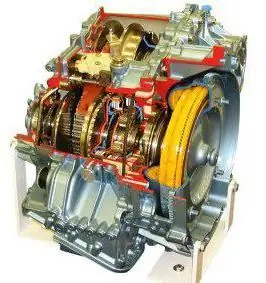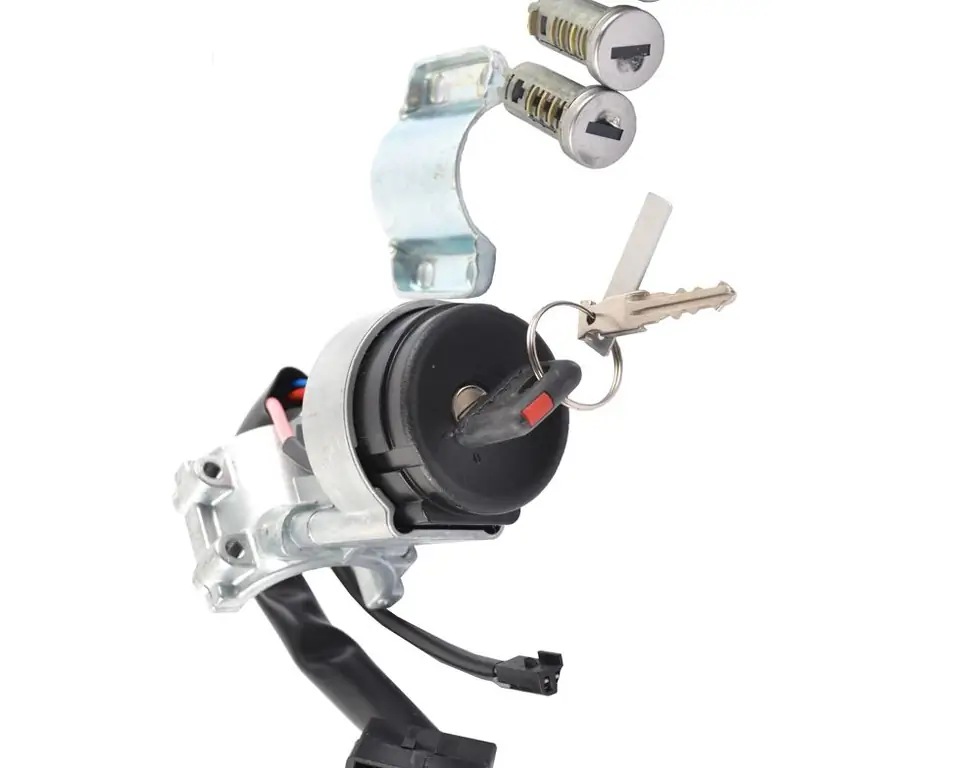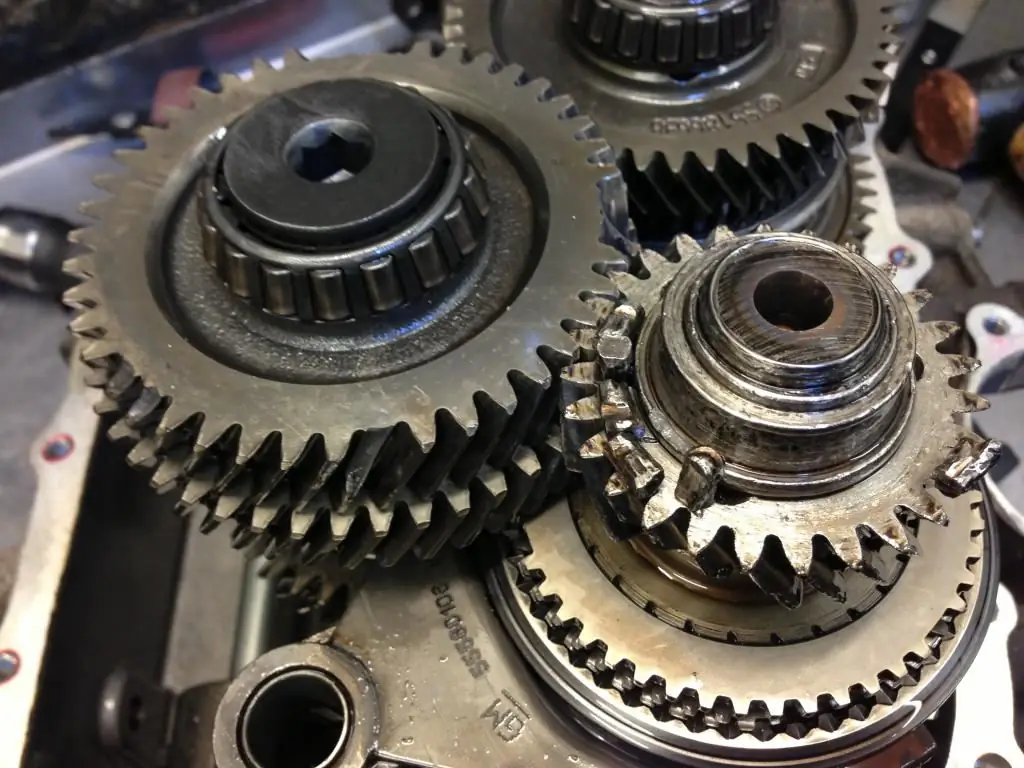2026 Author: Erin Ralphs | ralphs@carsalmanac.com. Last modified: 2025-01-22 21:14:11
Despite the growing popularity of automatic transmission cars, classic mechanics are still held in high esteem by many drivers. It is more reliable than automatic transmission. But during operation, the driver is constantly forced to work with the clutch pedal. This causes some inconvenience, especially in a traffic jam. So there was a hydromechanical gearbox. The principle of its operation and the device will be considered in our today's article.
Characteristic
Those drivers who do not want to work with the clutch prefer this particular transmission. The hydromechanical gearbox performs several functions at once. It combines a clutch and a classic box.

Gear shifting here is done automatically or semi-automatically. The hydromechanical gearbox of the loader is arranged in the same way. While driving, the driver does not engage the clutch pedal. All you need is an accelerator and a brake.
Ohdesigns
The device of the hydromechanical gearbox assumes the presence of a hydraulic transformer. This element, depending on the design features, can be two-, three- and multi-shaft. Now manufacturers use a planetary automatic hydromechanical gearbox.
How a shaft gearbox works
Trucks and large buses most often use a multi-shaft transmission. In order to change gear, multi-plate clutches are used here. They need lubrication to work. The oil of a hydromechanical gearbox differs significantly in consistency from the "mechanics". In the latter case, it is thicker. In order to include the first and reverse speeds on hydromechanics, gear couplings are used. This design allows the most smooth transmission of torque from the flywheel to the wheels.
Planetary
This is now the more common hydromechanical transmission.

It has become popular due to its compact size and light weight. Another advantage of the planetary transmission is a long service life and no noise during operation. But such a box also has disadvantages. Due to the design features, such a transmission is more expensive to manufacture. It also has low efficiency.
How the planetary gearbox works
Its operation algorithm is extremely simple. Gear shifting on a planetary hydromechanical transmission is carried out usingfriction clutches. Also, to smooth out shocks when switching to a lower one, a special brake band is used. It is during the operation of the "brake" that the force of torque transmission is reduced. But at the same time, gear shifting is smoother than that of shaft analogs.
The planetary transmission is based on a hydraulic transformer. This element is located between the engine and gearbox. GDP consists of several components:
- Reducer wheel.
- Pump.
- Turbine.
People call this element a "donut" because of its characteristic shape.

When the engine is running, the pump impeller rotates with the flywheel. The lubricant penetrates into the pump and then, under the influence of centrifugal force, begins to rotate the turbine. Oil from the last element penetrates into the reactor, which performs the function of smoothing shocks and shocks, and also transmits torque. Oil circulation is carried out in a closed circle. The power of the car increases when the turbine wheel rotates. The maximum torque is transmitted when the machine is moving from a standstill. In this case, the reactor is in a stationary state - it is held by a clutch. As the vehicle picks up speed, both the turbine and pump speed increase. The clutch is wedged and the reactor rotates at increasing speed. When the speed of the last element is maximum, the torque converter will go into the clutch operation state. So it will rotate at the same speed as the flywheel.
Design features of the planetary gearbox
The planetary hydromechanical gearbox consists of a drive shaft on which an articulated gear is located. There are also satellites that rotate on separate axes. These elements are engaged with the internal teeth of the box and the ring gear. The transmission of torque is due to the action of the brake band. It brakes the ring gear. As the car accelerates, their speed increases. The driven shaft is activated, which perceives the transmission of torque from the master.

How does the GTF set the right gear ratio? This action is performed automatically. When the speed of rotation of the car wheel increases, the oil pressure increases, which goes from the pump to the turbine. Thus, the torque at the latter increases. Accordingly, wheel speed and vehicle speed also increase.
About efficiency
As for the efficiency, it is an order of magnitude lower than in shaft gearboxes.

Its maximum value is from 0.82 to 0.95. But at medium engine speeds, this coefficient does not exceed 0.75. This figure rises as the load on the torque converter increases.
Maintenance and repair of hydromechanical transmission
When operating this transmission, it is necessary to monitor the oil level. This fluid is working here. It is the oil that uses the turbines to transmit torque. On mechanical boxesit just lubricates the rubbing gears. Manufacturers recommend changing the oil on hydromechanical boxes every 60 thousand kilometers. It is worth noting that the design of such a gearbox has its own filter. It also changes when this period is reached. Running at low oil levels can cause transmission slippage and overheating.

As far as repairs are concerned, the hydraulic transformer most often fails. A symptom of a malfunction is the impossibility of engaging one of the gears, an increased time for “acting” the desired speed. Also in this case, the oil intake mesh is disassembled and cleaned and the spool-type valve is changed. If there are leaks, it is necessary to check the tightening torque of the bolts and the condition of the sealing elements. During operation, metal chips form on the filter. It clogs the mechanism and the oil pressure level drops. At increased loads, the resource of this cleaning element is reduced. In this case, it is recommended to change it every 40 thousand kilometers.
How to extend the resource
To increase the life of the hydromechanical box, it is necessary to monitor the oil level. With its insufficient amount, the box overheats. The operating temperature should not exceed 90 degrees. Modern cars are equipped with an oil pressure sensor. His control lamp lit up, do not ignore it. In the future, this may provoke a breakdown of the torque converter.

Also, do not change gears without depressing the brake pedal. The box will take all the impact, especially if you switch from first to rear without first braking. On the go, if it is a long descent, it is not recommended to turn on the "neutral". This also significantly reduces the resource of the hydraulic transformer and working couplings. For the rest, it is necessary to adhere to the regulations for changing the oil and filters. The service life of this checkpoint is about 350 thousand kilometers.
Conclusion
So, we found out what a hydromechanical gearbox is. As you can see, with proper maintenance, it will be as reliable as a mechanical one. In this case, the driver does not have to constantly depress the clutch.
Recommended:
Gearbox "Kalina": description, device and principle of operation

Some of the car owners heard that the Kalina checkpoint has a cable drive, someone - that multi-cone synchronizers are installed inside. Someone heard that in the car there is an old box developed by Renault, which was given to AvtoVAZ. How is the Kalina gearbox arranged, what is new in it?
The principle of operation of the variator. Variator: device and principle of operation

The beginning of the creation of variable programs was laid in the last century. Even then, a Dutch engineer mounted it on a vehicle. After such mechanisms were used on industrial machines
Gearbox ZIL-130: device, characteristics and principle of operation

Gearbox ZIL-130: description, diagram, photo, design features, operation, repair. Technical characteristics of the ZIL-130 gearbox, device, principle of operation
"Lada-Kalina": ignition switch. Device, principle of operation, installation rules, ignition system, advantages, disadvantages and features of operation

Detailed story about the ignition switch Lada Kalina. General information and some technical characteristics are given. The device of the lock and the most frequent malfunctions are considered. The procedure for replacing with your own hands is described
Planetary gearbox: device, principle of operation, operation and repair

Planetary gears are among the most complex gear boxes. With a small size, the design is characterized by high functionality, which explains its widespread use in technological machines, bicycles and caterpillar vehicles. To date, the planetary gearbox has several design versions, but the basic principles of operation of its modifications remain the same

